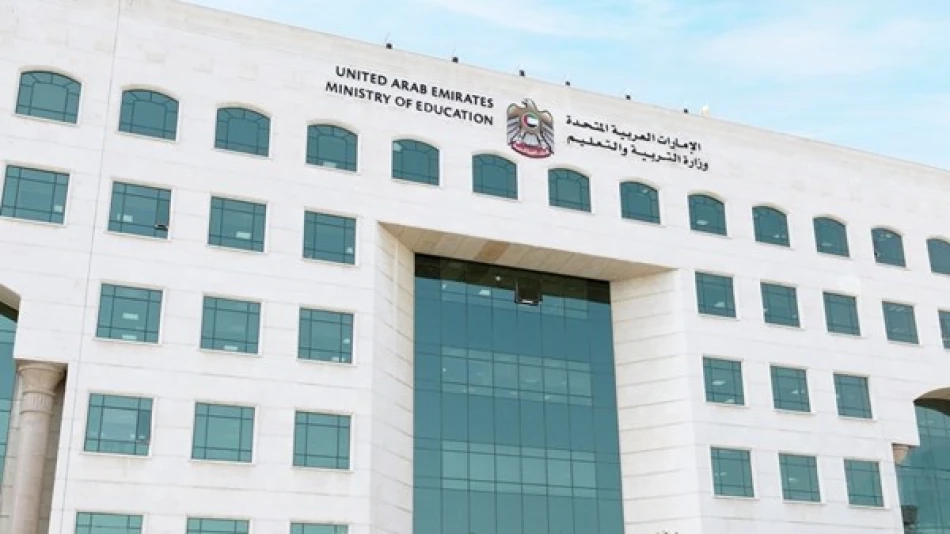
Smooth Transition: 8 Key Sectors Spearhead School Reopening Plans
UAE Launches Ambitious AI-Integrated School Year as Education Ministry Completes Massive Overhaul
The UAE's Ministry of Education is putting finishing touches on what could be one of the most comprehensive educational transformations in the Gulf region, as schools prepare to open on August 25th with artificial intelligence formally integrated into the curriculum. Eight major government sectors have been working since February in an unprecedented coordination effort that signals the Emirates' determination to position itself as a global education hub while other nations still debate digital learning strategies.
A Six-Month Preparation Unlike Any Other
Education Minister Sarah Al Amiri revealed that preparations began as early as February 2024, involving specialized teams across the ministry working in close partnership with local authorities in each emirate. This timeline suggests a level of planning that far exceeds typical academic year preparations, indicating the UAE's recognition that educational excellence has become a cornerstone of its economic diversification strategy.
The scale is remarkable: as the country's largest employer, the public education system requires institutional integration across multiple government levels to ensure every student receives world-class education regardless of geographic location. This approach mirrors Singapore's centralized education planning model, which has consistently ranked among the world's top performers in international assessments.
AI Integration: Beyond Pilot Programs
The formal inclusion of artificial intelligence in the curriculum represents a significant departure from the cautious, pilot-program approaches seen in most developed nations. While countries like the United States and United Kingdom are still conducting limited AI education trials, the UAE is implementing system-wide integration.
Deputy Education Minister Mohammed Al Qasim emphasized that teacher training has been central to preparations, ensuring educators are equipped to deliver new curricula effectively. This comprehensive approach addresses the primary challenge facing AI education globally: the gap between technological capability and teacher readiness.
Infrastructure and Security: Learning from Regional Experiences
The ministry's focus on safety and security infrastructure reflects lessons learned from rapid educational expansion across the Gulf region. The comprehensive approach includes facility monitoring, security protocols, and systematic student-teacher assignments designed to eliminate first-day disruptions that have plagued other large-scale educational launches.
This attention to operational details suggests the UAE has studied the challenges faced by neighboring countries during their own educational modernization efforts. Saudi Arabia's Vision 2030 education reforms, for instance, encountered initial implementation difficulties that the UAE appears determined to avoid.
Economic and Strategic Implications
The timing and scale of these educational reforms align closely with the UAE's broader economic strategy. As the country seeks to reduce oil dependency and build a knowledge-based economy, educational excellence becomes crucial for attracting international talent and investment.
For multinational corporations considering Middle East expansion, the UAE's commitment to world-class education infrastructure represents a significant competitive advantage over other regional hubs. The integration of AI education particularly positions the Emirates to supply the tech-savvy workforce that global companies increasingly demand.
Setting Regional Standards
The UAE's systematic approach to educational transformation could establish new benchmarks for the region. Unlike ad-hoc reforms seen elsewhere, the eight-sector coordination model and six-month preparation timeline suggest a replicable framework that other Gulf states may adopt.
The emphasis on ensuring consistent quality regardless of location addresses a common challenge in rapidly developing economies, where urban-rural education gaps often widen during periods of rapid change. By prioritizing equity alongside innovation, the UAE is positioning itself as a model for sustainable educational development in emerging markets.
As schools open next week, the success or failure of this comprehensive approach will be closely watched by education policymakers across the region and beyond, potentially influencing how other nations approach large-scale educational modernization in an AI-driven world.
Most Viewed News

 Layla Al Mansoori
Layla Al Mansoori






